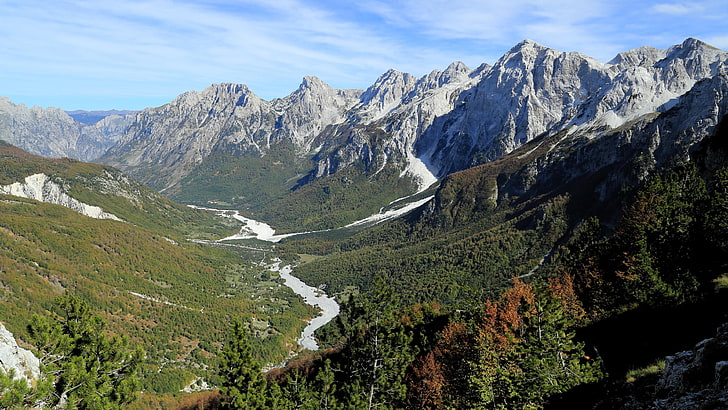
Leader of the Opposition and Chairman of the Democratic Party Lulzim Basha has presented his party’s program for energy.
He said that the PD would increase the security of energy supply in the country, through investments in green and clean energy sources.
“Albania will benefit from its excellent geographical position, becoming a center for the supply of the entire Balkans, and even more beyond, with natural gas, which is cleaner, more inexpensive and will strengthen our economy.”
He added that this would include a focus on hydropower and wind energy and would encourage the production of energy from “green and clean sources”.
The matter of hydropower in Albania has been controversial over the last few years. This is due to a vast number of permits for small hydropower plants being issued for rivers that are of significant ecological value.
These small hydropower plants divert water from the main river flow to be used to generate power. The problem is that Albania does not have any proper standards for how much water is allowed to be diverted meaning there are cases where the river bed dries up completely. Furthermore, water is diverted away from communities and families who rely on the river to irrigate the land they cultivate.
Not only does it impact them but if the river dries up slightly or completely, species of fish, insects, and mammals that live there end up disappearing completely. Even if the river was to return, many of these species would not.
Currently, the Vjosa river is under threat from the construction of several HPPs including the Pocemi and Kalivac. These were approved despite Prime Minister Edi Rama saying they would not be. Other areas have been stripped of their protected status to make way for more construction.
Other areas under threat include the Valbone River and its National Park, Lure-Mali I Dejes National Park, the Veleshica River, the Ligjanca River, the Shushica River, the Darsi Stream, the Shutri Stream, and the Gashi River that flows through an area that is on the UNESCO World Heritage list.
Some of the currently proposed or under construction projects are located in protected areas, or on rivers that are currently ‘wild’ and untouched. Even for those that are not in National Parks or protected areas, the construction and operation of plants would impact the habitat within their borders.
Not only this but there have been multiple instances of alleged corruption and the harassment of those who oppose such projects. Those who have challenged the construction and legality of permits issued have found themselves in long, drawn-out court cases and have claimed witnesses and signatories to suits have been intimidated. Catherine Bohne, an activist in Valbone said that many local people are too afraid to go against the developers and state for fear of losing everything.
She also detailed cases where environmental reports were only a page long and allegedly included the signatures of dead people and those employed by the developers.
While hydropower is a ‘clean’ form of energy, some studies have suggested that its overall ‘footprint’ including operations and construction means it is quite environmentally unfriendly. Moving aside from the damage it does to the local environment, reservoirs formed by dams emit more methane than previously realized. Methane is 30 times more potent than other greenhouse gasses meaning it is far worse for the environment.
The European Commission also criticized Albania for its propensity for hydropower in its country progress report last year.
The EC raised concerns regarding permits awarded by the Albanian government to construct potentially highly damaging structures in protected areas. It adds that proper procedures were not followed in awarding such permits, including impact assessment and public consultations. Furthermore, proper environmental legislation has not been approved and culprits of illegal activities have not been held accountable.
They called on the government to comply with national and international nature protection and water management obligations, ensure public participation and consultation, and guarantee projects’ impact assessment on nature and biodiversity.
Bohne explained that HPPs don’t automatically mean cheaper energy. Electricity produced by HPP isn’t stored, so it’s only available when the water is at a sufficient level to generate electricity i.e. spring and autumn. In winter and summer when the water is lower, the HPP makes little energy yet these are times when the requirement for energy is higher. This means Albania would have to buy electricity or find it from another source- therefore rates would go up, costing more to the customer.

